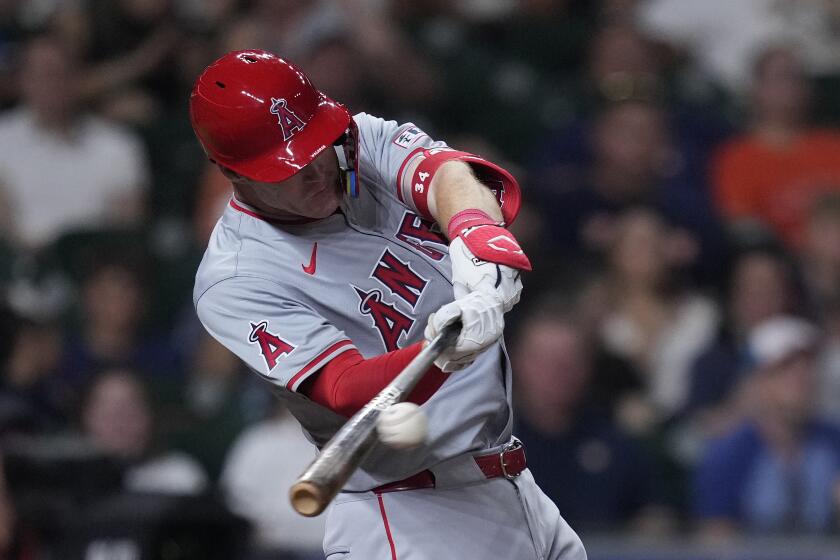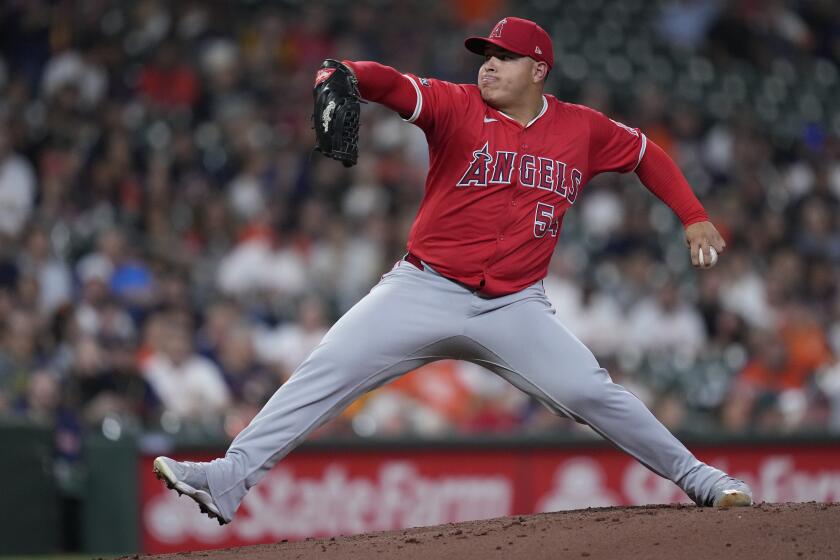Agent provocateur
Scott Boras wouldn’t say this is an important winter for him. He denied that he thinks he has to restore an image that was tarnished a year ago.
Sitting in his office in Newport Beach last week, baseball’s most powerful agent turned questions about him into answers about what the presence of Manny Ramirez and Mark Teixeira will mean for their potential employers.
“I look at it as an extraordinary opportunity for franchises, because when you look at the number of franchise players that are normally available in free agency, you’re not going to have that many that hit the market because they usually sign before they ever get there,” he said. “The question is, how often do you have access to the player that can give you all the qualities that these players represent to facilitate the needs of your franchise?”
Behind Boras, outside the glass doors of his personal work space, were Gold Glove trophies and life-size images of his clients. Whatever statistics he wanted were at his disposal, courtesy of a computer in the basement operated by a former NASA engineer that has video of games and data dating to 1871.
The sun was setting outside, but several of the 70-plus employees of the Boras Corp. were still at work, briskly walking around the office and occasionally dropping by to deliver a quick message to the boss.
Preparations for the most important time of Boras’ year had to be done.
Four days later, Boras shifted his base operations to the St. Regis Resort Monarch Beach, which is only a 10-minute drive from his office. The hotel is the site of the general managers’ meetings, which started Monday and will run through Thursday.
Boras has players to sell.
He has 16 clients who are free agents this winter, a cast that includes pitcher Derek Lowe and catchers Jason Varitek and Ivan Rodriguez.
“We’re going to do $300 [million]-$400 million in contracts like we did three or four years ago,” Boras said, referring to the winter of 2004-05.
Teixeira alone is expected to command a deal worth more than $100 million. Ramirez also could get a nine-figure deal if Boras can convince teams that his age, 36, shouldn’t diminish his value. If he can’t, everyone will be forced to wait. At least that’s the expectation.
Asked how soon he expected to learn where Ramirez would play baseball next season, Dodgers General Manager Ned Colletti smiled and nearly started laughing. Colletti gathered himself and gave a measured response.
“I’m not too confident it will be resolved in the next short period of time,” Colletti said.
Angels GM Tony Reagins seemed to have similar thoughts about his effort to re-sign Teixeira. Though Reagins said the Angels have “high-level interest” in the first baseman, he added, “At some point, you have to move forward with your off-season plans.”
To Colletti, Reagins and most baseball executives, Boras is still Boras, even if his reputation took a hit last winter when he reportedly was fired by New York Yankees third baseman Alex Rodriguez and rehired to negotiate his record contract extension only because baseball rules required Rodriguez to have an agent.
Boras said the widely held perception of what happened is wrong.
“What was put out there was way off base,” he said.
Boras also denied that his relationship with Rodriguez became strained when he advised him to opt out of the record 10-year, $252-million deal the agent negotiated for him after the 2000 season.
“We did A-Rod’s contract,” he said. “We still represent A-Rod.”
Rodriguez’s extension was worth $275 million over 10 years.
Boras said his company has negotiated about $4 billion in contracts. He represents more than 70 major league players and another 70 minor leaguers, who are well taken care of. The Boras Corp. employs two psychologists and a conditioning coach who runs the Boras Sports Fitness Institute. The company has a marketing and personal management division.
Boras said his company has never had outside investors.
“You can’t have bills because your interest has to solely be on the athlete,” he said. “In the corporate world, a lot of agents have demands on them from the board. They have to make revenue. My attitude is that whatever you do in this business, whatever you own, whatever you have has to be paid for. That way when you’re negotiating, you’re negotiating strictly for the client, not for the need for money.”
But it also meant, Boras said, that he lost money in his first 10 years in the business.
Boras was the second-oldest of four children who grew up in a modest household in Elk Grove, south of Sacramento.
He said he used to wake up between 4:30 and 5 a.m. every morning to work on the family farm. Until his chores were done, he said, he couldn’t play baseball.
He earned a scholarship to the University of the Pacific and was a minor league outfielder and infielder in the St. Louis Cardinals and Chicago Cubs systems.
He went to law school when his career was cut short by knee injuries and did medical malpractice work in Chicago. He started representing some of his former teammates and became a full-time agent in 1985.
Boras has been credited -- and vilified -- for his role in landing record contracts for major league and amateur players.
“Scott has always pushed the envelope on player compensation,” said San Diego-based agent Barry Axelrod.
His methods have been questioned by many in baseball, including several major league executives who said they didn’t want to be interviewed on the record because they expect to negotiate with Boras in the future.
The Dodgers are certainly wary of him.
Colletti was caught by surprise two winters ago when J.D. Drew, a Boras client, unexpectedly opted out of his contract and left the Dodgers with a vacancy in the outfield. The Dodgers signed Juan Pierre to a five-year, $44-million deal that winter.
Last winter, the Dodgers signed another Boras client, Andruw Jones, to a two-year, $36.2-million deal.
Jones hit .158 with three home runs in 75 games and owner Frank McCourt has become increasingly distrustful of the agent, according to multiple baseball sources.
Colletti didn’t want to talk about Boras, saying he doesn’t like to discuss his dealings with specific agents.
Reagins talked but didn’t say much.
“What we understand is that he has to do his job as the advocate for the player,” he said. “And we have to do our job as an advocate for the club.”
--
More to Read
Go beyond the scoreboard
Get the latest on L.A.'s teams in the daily Sports Report newsletter.
You may occasionally receive promotional content from the Los Angeles Times.




